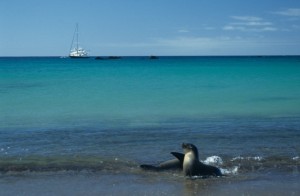Ecotourism sounds like it is good for the environment: after all it has the word “eco” in it. But like many things too much of a good thing can cause irreversible damage and this is true for the environment and those wishing to visit pristine areas.
Ecotourism Benefits of Galapagos Islands
Take for example the case of the Galapagos Islands. This set of islands is isolated from every other bit of land and is located off the coast of Ecuador. The Galapagos Islands are most well-known for the wide variety of species (especially the large tortoises, the iguanas, and finches) and their role in Charles Darwin’s studies about the theory of evolution.

Since Darwin’s time, a small human settlement was established on the island but for the most part the Galapagos Islands have remained much the same through the centuries. In fact, in the 1960s the islands had a total human population of about 1,000 people and were primarily associated with the Islands’ research station. However, today more the 40,000 people live on the island and many of those are there to support the tourist industry.
The influx of people onto this once isolated chain of islands has had an astonishing effect on the local ecosystem. The surrounding waters have been subject to illegal overfishing, residents have introduced invasive species of both plants (garden plants) and animals (including pet cats that decimate the native bird population), and native habitat has been cleared for human settlement.
So, what has changed in the last 40 years? The simple answer is the rise of ecotourism. More than 150,000 tourists visit the Galapagos Islands each year and a variety of industries have developed to support them including taxi services, marinas, charter boats, cruise boats, hotels, and tour guides. This has a rippling effect throughout the population as residential support industries and developed to support the tourist industry (schools, grocery stores, libraries, gas stations, etc.).
The Ecuadorian government has taken steps to try and limit the direct effect of ecotourism and the residents on the Galapagos Islands ecosystem. Tourists must pay high fees to enter the preserve and only with certified guides and only to specific area of the islands. People are not allowed to touch or feed the wildlife and are not allowed to leave the approved pathways. There are also very few options to limit the indirect effects of tourists and residents on the local ecosystem. Water pollution, air pollution, and solid waste all eventually end up as contaminants in the environment.
Tourism brings in a lot of money into the national economy and it is a constant challenge to balance the environment with the economy. -KATHY FAIRCHILD